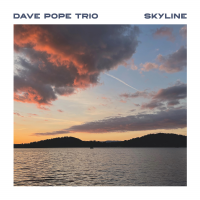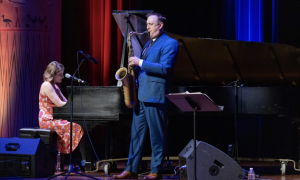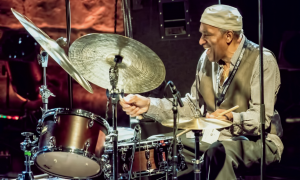Home » Jazz Articles » Catching Up With » Trilok Gurtu: Where East Meets West
Trilok Gurtu: Where East Meets West

All About Jazz: You are coming from a family with an illustrious musical tradition. Were you exposed to jazz along you early musical education?
Trilok Gurtu: I just went with the flow, because we were listening to all kinds of music. Jazz was something new. An Indian listening to [trumpeter]

Don Cherry
trumpet1936 - 1995

Ravi Shankar
sitar1920 - 2012
AAJ: Do you remember the first time you heard jazz?
TG: It must have been in the radio when I was about 16. The tune I first heard must have been [pianist]

Dave Brubeck
piano1920 - 2012
AAJ: You lived, for some time, in America. How was the experience?
TG: I decided to go to the Berklee College of Music. I wasn't a studied musician, you know, and I wanted to learn about composing and harmony more than about rhythm. And thank God I did not get admitted, because I wouldn't have been myself. I would have probably become a jobless, hardcore jazz musician. I think that I had a few cultural disconnects in those days. The main thing I was missing there was humility. I was very angry then, but now when I look back, America was a very good experience. I made many friends there and I played with many very good musicians like [drummer]

Jack DeJohnette
drumsb.1942

Dave Holland
bassb.1946
AAJ: Where is the point of fusion between the Indian and the Western heritage in your music? Where do they separate?
TG: Long ago, I would have said that they are two separate things, but not today. Was it Rudyard Kipling who said that East and West would never meet? He was completely wrong. They may not meet politically, but they certainly meet musically. Because music, like God, is one entity that contains us all. It is separated by mind, the different concepts and rules everybody has. If we were humble enough we would recognize it as an entity. If you are open to it, it is easy. For me it is easy. I keep my mind open. Why close the door? I have always enjoyed all music.
 AAJ: Has the Western experience influenced your relationship to your instrument in any way?
AAJ: Has the Western experience influenced your relationship to your instrument in any way?TG: I only got better. I always knew what was good for me, so I didn't pick up everything [laughs]. If the basics are strong they don't need to change.
AAJ: Do you play differently, when you are in Europe?
TG: No. Why should I do it? Do you change your language? This is what people do to please the audience. I am here to play my music.
AAJ: Which phase of your formation proved most significant for your ulterior development?
TG: In the eighties I already had a musical personality, but it really came out when I met [guitarist]

John McLaughlin
guitarb.1942
AAJ: Talking about meeting the right people, you have a long history of playing together with saxophonist

Jan Garbarek
saxophoneb.1947
TG: We are very good friends. We've played together since the eighties, too, like with Ravi Shankar and [percussionist]

Nana Vasconcelos
percussion1944 - 2016

Joe Zawinul
keyboards1932 - 2007
AAJ: Jan Garbarek, The African Project, pianist

Tigran Hamasyan
piano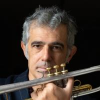
Paolo Fresu
trumpetb.1961
TG: It is not so much a matter of style as a matter of a similar way of thinking. People who think alike get along well together. Sometimes it does not work and I have to stop it. I will not give names, but that happens too. So, I would say that it is a matter of personal and musical chemistry.
AAJ: Not long ago you recorded a song with Italian singer Adriano Celentano; how did that go?
TG: Italy is one of my favorite places: I like the people; I have many friends there; I even speak Italian. I like the food and the wine there. The recording with Adriano was fantastic. He is a great artist. It was fun to do that: the way he would explain what he wanted, and the way he kept forgetting my name. Just like

Frank Zappa
guitar, electric1940 - 1993
AAJ: Would you call yourself a jazz musician?
TG: What is jazz? If you say that jazz is American I am not going to answer this question. Indian music was the first music that was improvised. What is left of jazz if we take African or classical music out? Or even Apache music? Do you know how much trumpeter

Don Ellis
trumpet1934 - 1978
 "
data-original-title="" title="">Monk and all that, but I think that the term has become too restrictive. The term jazz has become discriminative because it is too narrow. You cannot put music in a box and start fighting about it instead of letting it be and develop. Let the great voice talk and not the small insects who talk about it. Let the great power in us talk. For that you have to give credit.
"
data-original-title="" title="">Monk and all that, but I think that the term has become too restrictive. The term jazz has become discriminative because it is too narrow. You cannot put music in a box and start fighting about it instead of letting it be and develop. Let the great voice talk and not the small insects who talk about it. Let the great power in us talk. For that you have to give credit.AAJ: Where is jazz going?
TG: To be honest, I don't really care. I am not a theoretician. I am not really interested in what it is called and what they are doing. There are fantastic gospel musicians who are really good. I like to hear it sometimes, but that's not what I play. I'm not sure if people understand that. Too much knowledge presented at the wrong time can go completely wrong.
AAJ: If you would give jazz a name what would that name be?
TG: I don't know what that name would be. Maybe world music. Call it what you want.
AAJ: What are you listening to these days?
TG: I listen to Bach, Brahms, a lot of African and Indian music. I listen to Don [Cherry], to [saxophonist]

Ornette Coleman
saxophone, alto1930 - 2015
AAJ: Are you still practicing?
TG: I do. I like to play, so I get together with my instrument as often as possible.
AAJ: Are you still nervous before a performance?
TG: If I am not sure of myself, yes. But now I am not unsure anymore. Once I became initiated by my spiritual master, Ranjit Maharaj, all weakness and fear was gone. I am a lucky man.
AAJ: What are you working on right now?
TG: I am working on a new album. We'll finish it in December and it will come out early next year. It is called Trumpets, and I play on it with Paolo Fresu,

Nils Petter Molvaer
trumpetb.1960

Ibrahim Maalouf
trumpetb.1980

Miles Davis
trumpet1926 - 1991

Dizzy Gillespie
trumpet1917 - 1993
Selected Discography
Trilok Gurtu/Simon Phillips/NDR Big Band, 21 Spices (Art of Groove, 2011)
Trilok Gurtu, Massical (BHM Productions, 2009)
Joe Zawinul, My People (Escapade, 1996)
Trilok Gurtu, Crazy Saints (CMP, 1993)
John McLaughlin Trio, Que Alegria (Verve, 1992)
Oregon, Always, Never and Forever (Intuition, 1991)
Photo Credit
Anna Rezulak
Tags
Trilok Gurtu
Catching Up With
Adriana Carcu
India
Mumbai
Don Cherry
Ravi Shankar
Dave Brubeck
Jack DeJohnette
Dave Holland
john mclaughlin
Jan Garbarek
Nana Vasconcelos
Joe Zawinul
Tigran Hamasyan
Paolo Fresu
Frank Zappa
Don Ellis
Thelonious Monk
Ornette Coleman
Nils Petter Molv?r
Ibrahim Maalouf
Miles Davis
Dizzy Gillespie
Comments
PREVIOUS / NEXT
Support All About Jazz
 All About Jazz has been a pillar of jazz since 1995, championing it as an art form and, more importantly, supporting the musicians who make it. Our enduring commitment has made "AAJ" one of the most culturally important websites of its kind, read by hundreds of thousands of fans, musicians and industry figures every month.
All About Jazz has been a pillar of jazz since 1995, championing it as an art form and, more importantly, supporting the musicians who make it. Our enduring commitment has made "AAJ" one of the most culturally important websites of its kind, read by hundreds of thousands of fans, musicians and industry figures every month.



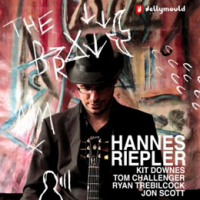



 Buy Now
Buy Now

